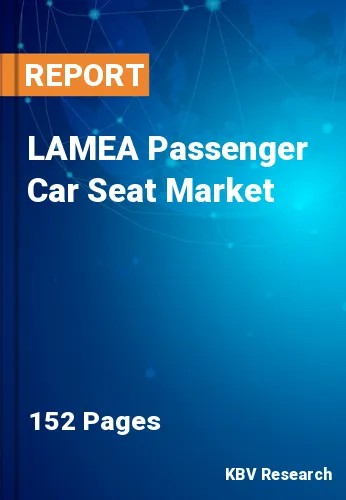The Latin America, Middle East and Africa Passenger Car Seat Market would witness market growth of 3.3% CAGR during the forecast period (2023-2030).
The rising demand for hybrid and electric vehicles in developing nations drives the need for automotive seating, thereby driving market expansion. The market is expanding due to several factors, including the development of the automotive industry, the advancement of technology, the focus of automotive manufacturers on lightweight seats, and an increase in occupant convenience. A rise in vehicle production also stimulates the market.
Automakers are conducting more research to innovate their products. The manufacturers' primary concentration is on smart seats for smart vehicles that improve the seat's comfort. The sophisticated innovations implemented in vehicle seating are driving market expansion. In emerging markets, automakers emphasize the development of lightweight interior components, and improvements in fuel economy are driving market expansion.
Some vehicles feature rear seats that fold down to accommodate luggage when a passenger does not occupy them. A few vehicles have seats equipped with battery-powered automatic controls for adjusting seat flexibility. Individual seats typically feature round backs and various alterations, including cushion edge, backrest modification, armrest, and seat height. The increasing sales of commercial and passenger vehicles are one of the major factors propelling the market.
The automotive industry in the LAMEA region is one of the primary generators of the UAE's economic expansion. Even though the UAE has a superior standard of living than anywhere else, it has the highest population density. Moreover, Dubai does not tax its citizens' income. Consequently, the UAE's demand for luxury products, particularly automobiles, is increasing. It is conceivable that the swiftly rising demand for luxury vehicles in the United States is a consequence of higher consumer per capita income, improved road conditions, or advantageous tax legislation. As the automotive sector in the region expands, and demand for prestige vehicles is anticipated to increase, so will the market.
The Brazil market dominated the LAMEA Passenger Car Seat Market by Country in 2022, and would continue to be a dominant market till 2030; thereby, achieving a market value of $921.1 million by 2030. The Argentina market is estimated to grow at a CAGR of 3.8% during (2023 - 2030). Additionally, The UAE market would exhibit a CAGR of 3% during (2023 - 2030).
Based on Seat Type, the market is segmented into Bucket, and Split/Bench. Based on Technology, the market is segmented into Powered Seats, Standard Seats, Heated Seats, Powered, Heated & Memory seats, Powered, Heated & ventilated seats, Powered, Heated, & Memory Seats, and Powered, Heated, Ventilated, Massage, & Memory Seats. Based on Trim Material, the market is segmented into Synthetic Leather, Genuine Leather, and Fabric & Foam. Based on Component Type, the market is segmented into Seat Belt, Seat Frame & Structure, Armrest, Pneumatic System, Seat Headrest, Side/Curtain Airbag, Seat Headrest, Seat Recliner & Height Adjuster, and Others. Based on countries, the market is segmented into Brazil, Argentina, UAE, Saudi Arabia, South Africa, Nigeria, and Rest of LAMEA.
Free Valuable Insights: The Worldwide Passenger Car Seat Market is Projected to reach USD 47.3 Billion by 2030, at a CAGR of 1.8%
The market research report covers the analysis of key stake holders of the market. Key companies profiled in the report include Adient plc, Faurecia (Groupe PSA), Lear Corporation, Aisin Corporation (Toyota Motor Corporation), Magna International, Inc., TS TECH Co., Ltd., Johnson Controls International PLC, NHK Spring Co., Ltd, TACHI-S CO., LTD., Gentherm Incorporated
By Seat Type
By Technology
By Trim Material
By Component Type
By Country
Our team of dedicated experts can provide you with attractive expansion opportunities for your business.

